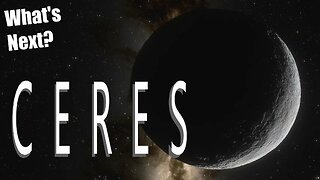Why Does Everyone Hate NASA?
WhatsNextVids on RUMBLE - https://rumble.com/user/WhatsNextVids
What's Next? on YOUTUBE - https://www.youtube.com/channel/UC4lzZ4Tyhkzl582_5jqW3rA
What's Next? on ODYSEE - https://odysee.com/@WhatsNext:5?view=content
Whats.Next on BITCHUTE - https://www.bitchute.com/channel/Yq06nyAcliTf/
Patreon - https://www.patreon.com/user?u=37594401
Buy Me A Coffee? - https://www.buymeacoffee.com/whats.next
Donate With Cash App - https://cash.app/$YTpayments
Useful Search Terms:
nasa nasa dart impact nasa dart live nasa documentary nasa discovered a new planet nasa discovery nasa dart mission live stream nasa dance nasa deep sea exploration nasa dart mission update d nasal septum nasa exploring the ocean nasa earth live nasa engineer nasa explosions nasa en español
Why does everyone hate NASA?
Why does NASA get so much hate?
NASA is huge waste of money
Defund NASA and feed the homeless
God I hate NASA
NASA is lying to us
NASA lies about everything
Nobody cares about the Moon NASA
“The Artemis II crew represents thousands of people working tirelessly to bring us to the stars. This is their crew, this is our crew, this is humanity's crew,” said NASA Administrator Bill Nelson. “NASA astronauts Reid Wiseman, Victor Glover, and Christina Hammock Koch, and CSA astronaut Jeremy Hansen, each has their own story, but, together, they represent our creed: E pluribus unum – out of many, one. Together, we are ushering in a new era of exploration for a new generation of star sailors and dreamers – the Artemis Generation.”
The crew assignments are as follows: Commander Reid Wiseman, Pilot Victor Glover, Mission Specialist 1 Christina Hammock Koch, and Mission Specialist 2 Jeremy Hansen. They will work as a team to execute an ambitious set of demonstrations during the flight test.
The approximately 10-day Artemis II flight test will launch on the agency’s powerful Space Launch System rocket, prove the Orion spacecraft’s life-support systems, and validate the capabilities and techniques needed for humans to live and work in deep space.
“We are going back to the Moon and Canada is at the center of this exciting journey,” said the Honorable François-Philippe Champagne, the minister responsible for the Canadian Space Agency. “Thanks to our longstanding collaboration with NASA, a Canadian astronaut will fly on this historic mission. On behalf of all Canadians, I want to congratulate Jeremy for being at the forefront of one of the most ambitious human endeavors ever undertaken. Canada’s participation in the Artemis program is not only a defining chapter of our history in space, but also a testament to the friendship and close partnership between our two nations.”
The flight, set to build upon the successful uncrewed Artemis I mission completed in December, will set the stage for the first woman and first person of color on the Moon through the Artemis program, paving the way for future for long-term human exploration missions to the Moon, and eventually Mars. This is the agency’s Moon to Mars exploration approach.
“For the first time in more than 50 years, these individuals – the Artemis II crew – will be the first humans to fly to the vicinity of the Moon. Among the crew are the first woman, first person of color, and first Canadian on a lunar mission, and all four astronauts will represent the best of humanity as they explore for the benefit of all,” said Director Vanessa Wyche, NASA Johnson. “This mission paves the way for the expansion of human deep space exploration and presents new opportunities for scientific discoveries, commercial, industry and academic partnerships and the Artemis Generation.”
The National Aeronautics and Space Administration (NASA /ˈnæsə/) is an independent agency of the U.S. federal government responsible for the civil space program, aeronautics research, and space research.
NASA was established in 1958, succeeding the National Advisory Committee for Aeronautics (NACA), to give the U.S. space development effort a distinctly civilian orientation, emphasizing peaceful applications in space science.[5][6][7] NASA has since led most American space exploration, including Project Mercury, Project Gemini, the 1968–1972 Apollo Moon landing missions, the Skylab space station, and the Space Shuttle. NASA supports the International Space Station and oversees the development of the Orion spacecraft and the Space Launch System for the crewed lunar Artemis program, Commercial Crew spacecraft, and the planned Lunar Gateway space station. The agency is also responsible for the Launch Services Program, which provides oversight of launch operations and countdown management for uncrewed NASA launches.
NASA's science is focused on better understanding Earth through the Earth Observing System;[8] advancing heliophysics through the efforts of the Science
-
 6:23
6:23
WHATSNEXTVIDS
9 months agoWhy CERES May Be Better Than MARS or The MOON to Colonize
1721 -
 1:53:30
1:53:30
Kim Iversen
6 hours agoBiden Confronts "Genocide Joe" Nickname, Ann Coulter Tells Vivek To His Face Only Whites Should Be President, The Great Taking w/ Chris Martenson
35.4K122 -
 1:44
1:44
Rebel News
6 hours agoLAST CHANCE! Tickets are almost sold out for Rumble Live and Rebel News Live!
29.5K12 -
 1:01:20
1:01:20
The StoneZONE with Roger Stone
9 hours agoJFK Murder Re-Examined. Shot From Front And Back = Conspiracy! The StoneZONE w/ Roger Stone
20.6K22 -
 1:08:00
1:08:00
TheMonicaCrowleyPodcast
9 hours agoReal Collusion with Benny Johnson
16.3K6 -
 1:38:38
1:38:38
OFFICIAL Jovan Hutton Pulitzer Rumble
4 hours agoKamala Clones! They Exist! Or At Least They All Went To The Same Political Prep School
19.4K8 -
 1:28:45
1:28:45
Donald Trump Jr.
12 hours agoInside Our Intel Agencies, a Lack of Intelligence: Former Deputy DNI Cliff Sims Knows Why | TRIGGERED Ep.135
102K95 -
 2:31:15
2:31:15
The Quartering
8 hours agoTrump Moves For Mistrial, Vivek Shunned For Being Indian, Psycho Journo & Marvel's Downfall
54.9K26 -
 1:04:56
1:04:56
Kimberly Guilfoyle
10 hours agoHOW LOW CAN JOE GO? The Left’s Lawfare Backfires, Live with DC Draino & Hogan Gidley | Ep. 124
45.8K33 -
 57:50
57:50
themidwesterner
5 hours agoJohn Eastman on lawfare in America, hosted by Michigan Fair Elections
13.7K2